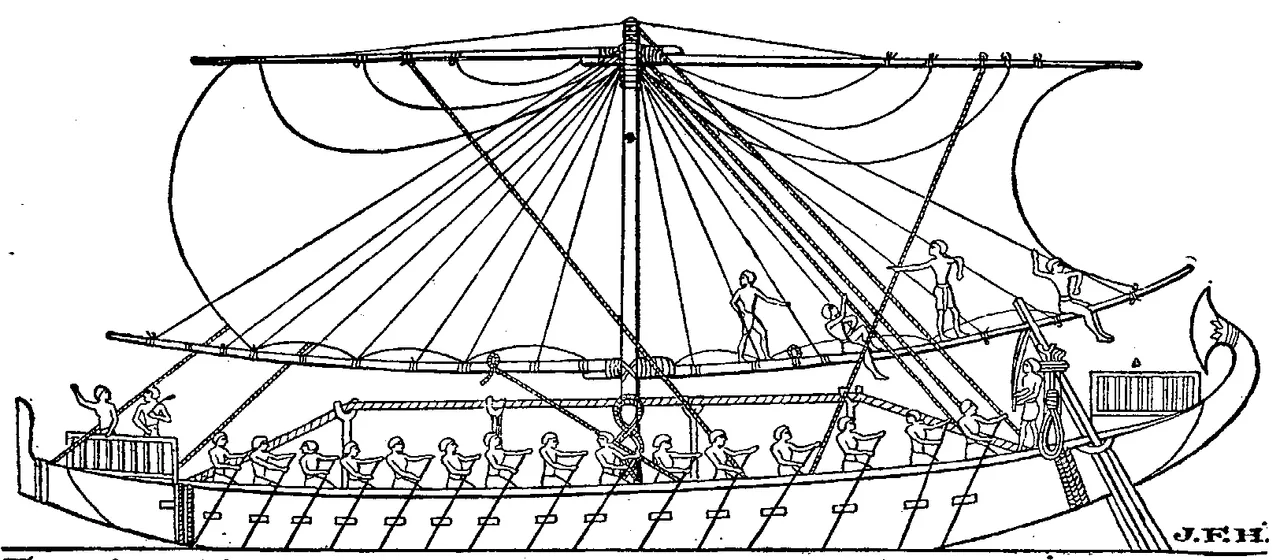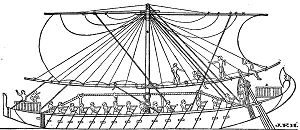
Pharos
Appearing and disappearing among the immense waves, lost, battered inclemently, by the winds, the ship had been able to approach at a prudent distance from an unnamed island. The crew launched, with difficulty, an anchor, which, like an extension of the hands and prayers of the sailors, clung to the turbulent bottom.
It was a moonless and starless night, the ship was a magnificent Egyptian merchant ship with its even curve from bow to stern, with a square sail. The beauty of its profile made it seem more fragile, a propitiatory victim of the tides.
One hundred and thirty resigned men sailed inside, conscious of being in the hands of the gods. They prayed that they could spend the night, that the next day's sun would warm the winds and carry away the stormy clouds. Perhaps, if the gods wished it, the stars could reappear and they could find their bearings again. There was also a dog in the boat.
The elegant ship had come from far away countries to travel the coasts. It was loaded with fine wood, elaborate fabrics and costly spices. It also carried 34 bronze ingots, thirty bronze statuettes and ten exquisite sarcophagi. But its greatest contents were the capitals and columns and the large blocks of stone from Italy. With a length of 28 meters, it could transport one hundred and fifty tons.
They spent three nights and three days stranded. At dawn on the fourth day, they weighed anchor and began to sail aimlessly. They sailed with clear skies and good wind for two days and one night. Normality returned to the work of the men, accustomed to the sea and its dangers. The men regained their optimism. A gray-haired old man began to sing insistently some isolated verses from the Odyssey.
"There is an island /in the turbulent sea /in front of Egypt/ they call it Pharos."
At dusk on the second day the winds reappeared. First as a caressing breeze, then it was a blizzard that increased until the waves began, again, to beat rudely against the boat.
A sliver of the moon was placed over the boat. Reinforcing the contrast of its whiteness, in the dotted sky, with the blackness of the rough sea.
The whole crew spent the night in vigil. The religious silence of the men was broken by the furious barking of the dog, which ran enervated from one side of the ship to the other.
"It's the remains of a shipwreck" shouted some sailor.
The rest of the crew heard the phrase as a death sentence.
The men looked out to see floating precious timbers, chests, corpses of burly men, countless barrels of wine spilling their precious contents into the murky waters, staining them with their bloody color.
In that climate of overpowering fear, the chant of the previous days returned to the sailors' minds and lips, but this time as a form of incantation:
"There is an island /in the turbulent sea/ opposite Egypt/ they call it Pharos."
The men began to row, in the opposite direction of the shipwreck, at the limit of their strength. They rowed without looking at the horizon, as people escape when they want to flee from death.
When the height of the waves diminished and the noise of the waves against the ship was no longer a mortal threat, the men raised their eyes, searching for the straight line that divides the blue of the sea from the blue of the sky.
They looked for a hint, an indication from the sky, a sign that would answer the question of whether they would continue to live.
Then they saw the flash. A golden circle, like a framed sun, in the distance.
Towards him the sailors, full of new strength, pointed the prow of the ship. Keeping their eyes on the light.
When at last they could see the coast they also distinguished, astonished, the beautiful architecture: a square base supported thinner and thinner buildings that rose towards the sky. At the top a mirror shone. On the pinnacle a statue of Zeus.
"Where are we?" they asked the first fisherman they could get.
"On the island of Pharos, City of Alexandria" replied the fisherman.
Thank you for reading !

